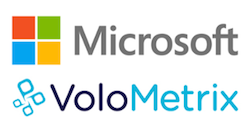 Microsoft’s recent purchase of organizational analytics specialist VoloMetrix underscores the growing trend of using intelligent virtual assistants within the enterprise. Specifically, there are many future use cases where employees could benefit from insights and work performance tips offered by intelligent assistants.
Microsoft’s recent purchase of organizational analytics specialist VoloMetrix underscores the growing trend of using intelligent virtual assistants within the enterprise. Specifically, there are many future use cases where employees could benefit from insights and work performance tips offered by intelligent assistants.
In announcing the acquisition, VoloMetrix CEO Ryan Fuller mentions that Microsoft has a vision “to reinvent productivity” in Office 365. With Cortana now embedded in Windows 10, with such capabilities as the Cortana Analytics Suite, and Office 2016 set to launch September 22nd, it might not be long before we see intelligent assistants collecting and analyzing data to help increase an enterprise worker’s productivity.
Based on information available on the VoloMetrix website, the company has software that aims to improve both personal and organizational productivity. On the personal productivity side, users can access a tailored dashboard that helps them target key areas for improvement. Employees leverage the dashboard to find effective ways in how they use their time.
For example, there’s a meeting effectiveness gauge that accesses calendar data to show how many meetings the employee participates in that adhere to various effectiveness criteria. Meetings that last less than an hour, contain no more than six participants, and receive the employee’s full engagement are considered to be of high quality. The dashboard helps the employee track the percentage of meetings he or she attends that meet these criteria. Employees can also set personal goals to increase the number of effective meetings they attend.
Another gauge measures the amount of time an employee spends doing email, both during work and after hours. An employee can also track how much they’re negatively impacting the productivity of others. The dashboard accomplishes this by capturing data on the frequency with which the employee emails people and how often he or she invites them to meetings. These activities impose on people’s time.
Intelligent Advisor for Employees
Now think of the possibilities if the employee agreed to allow an intelligent assistant to access this information. With knowledge of the employee’s goals and office circumstances, the assistant could play the role of adviser. Are you about to accept an invitation to a meeting that doesn’t look like it will be productive? If you can’t get out of it, the advisor could coach you on collaborating with the meeting organizer to structure a more effective meeting.
Your advisor could also encourage you to block off work time or stop answering emails and go engage with peers instead. Are you looking at work emails after hours? Your intelligent advisor could gently remind you of your work/life balance goals. Are you about to invite a co-worker to another meeting? The advisor could prompt you to think about how you’re imposing on that person’s time and offer ideas on how to engage with them differently.
Employees with access to an insightful, intelligent advisor could have a measurable advantage over those employees who don’t. Companies that provide the entire workforce with intelligent advisors could see substantial gains in overall productivity and employee morale. Microsoft may or may not incorporate any of the VoloMetrix capabilities into Cortana, but the possibilities are intriguing.
Categories: Conversational Intelligence, Intelligent Assistants, Articles

 Getting It Right: What AI Agents Actually Mean for Customer Support (Webinar)
Getting It Right: What AI Agents Actually Mean for Customer Support (Webinar)  Beyond the Basics: How AI Is Transforming B2B Sales at TP
Beyond the Basics: How AI Is Transforming B2B Sales at TP  Five9 Launches Agentic CX: Toward AI Agents That Reason and Act
Five9 Launches Agentic CX: Toward AI Agents That Reason and Act  2025 Conversational AI Intelliview: Decision-Makers Guide to Self-Service & Enterprise Intelligent Assistants
2025 Conversational AI Intelliview: Decision-Makers Guide to Self-Service & Enterprise Intelligent Assistants